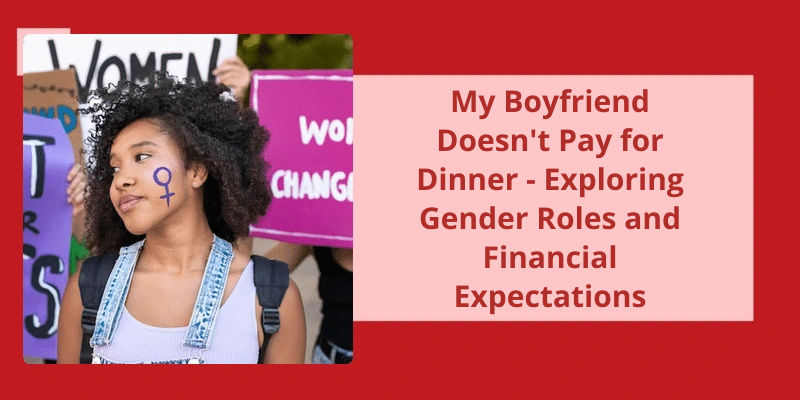It’s common to believe that having a partner who treats you with utmost kindness and respect is the ideal relationship. However, there are times when excessive niceness may raise a red flag and potentially become suspicious. When one's boyfriend is too nice, it can give rise to doubts and uncertainties about the underlying motives behind such behavior. While there could be genuine affection and care behind these actions, it’s important to remain vigilant and observant to avoid falling prey to potential manipulation or emotional abuse. A significant aspect to consider is to strike a balance between appreciating good treatment and not overlooking any warning signs that may suggest hidden agendas or ulterior motives. With the right approach, one can navigate such situations with care and make informed decisions that prioritize their well-being and safety.
Why Is My Boyfriend Being Overly Nice?
It’s important to approach the conversation with kindness and empathy, and try to understand where hes coming from. Perhaps hes just trying to be a good partner, but is going about it in the wrong way. Or maybe hes feeling insecure in the relationship and is overcompensating by being overly nice. Either way, it’s important to get to the root of the issue so that you can both work on it together.
This can be a sign of an unhealthy relationship, and it’s important to set boundaries and stand up for yourself if you feel uncomfortable or unsafe. Remember that you deserve to be treated with respect and kindness, and if your partner isn’t able to provide that, it may be time to reevaluate the relationship.
This could be anything from cheating to lying about his behavior or habits. While it’s important to give your partner the benefit of the doubt and trust them, it’s also important to pay attention to your intuition if something feels off. If you suspect that your partner is hiding something from you, have an honest conversation about your concerns and try to get to the truth of the matter.
Another possibility is that your boyfriend is genuinely trying to be a better person and partner. Perhaps hes realized that he hasnt been treating you with the respect and love that you deserve, and hes trying to make amends for that. This can be a great sign for the future of your relationship, but it’s also important to make sure that his actions match his words over time.
Ultimately, the reasons behind your boyfriends overly nice behavior could be complex and multifaceted. The most important thing is to communicate openly and honestly with him, and try to understand where hes coming from. By approaching the situation with empathy and compassion, you can work together to build a stronger, healthier relationship based on mutual respect and understanding.
How to Communicate Effectively With a Partner Who Is Being Overly Nice
- Be honest about your feelings
- Listen actively to what your partner is saying
- Acknowledge your partner’s efforts to be kind
- Express your appreciation for their behavior
- Set boundaries and communicate your needs clearly
- Work together to find a balance that works for both of you
- Be patient and understanding
- Don’t make assumptions about your partner’s intentions
- Be open to feedback and willing to make compromises
It’s important to understand why we may find ourselves constantly putting our partner’s needs before our own, and how it may be impacting the relationship. In this article, we will delve deeper into the reasons behind this behavior and explore healthy ways to navigate being too nice in a relationship.
When Someone Is Too Nice in a Relationship?
Whatever the cause may be, being too nice in a relationship can have negative consequences for both parties. On the surface, it may seem like the person who’s being overly accommodating is doing everything right – they’re always saying yes, they’re never causing any conflict, and they’re always putting their partners needs ahead of their own. However, this behavior can eventually lead to resentment and frustration for both partners.
For the partner who’s on the receiving end of all this niceness, they may start to feel like they’re walking on eggshells. They may worry that any disagreement or conflict will upset their partner, so they start to withhold their own wants and needs. This can lead to a lack of intimacy and connection in the relationship. Over time, they may start to feel like they aren’t in a true partnership, but rather in a one-sided arrangement where they’re only receiving without giving.
Ultimately, it’s important to find a balance in any relationship. Both partners should feel valued and heard, and both should be willing to compromise and work towards a common goal. But it’s through these uncomfortable feelings and experiences that we grow and learn about ourselves and each other.
How to Communicate Effectively in a Relationship Without Sacrificing Your Own Needs.
This article offers tips on how to communicate in a relationship without ignoring your own needs. It emphasizes the importance of active listening, setting boundaries, and expressing yourself in a constructive manner. By finding a healthy balance between listening and assertiveness, partners can build a stronger connection and meet each other’s needs.
While being a nice guy may seem like a positive trait, there’s a darker side to this personality type that can lead to unhealthy behaviors and beliefs. Let’s delve deeper into the psychology behind the nice guy and explore the potential ramifications of their mindset.
What Is the Psychology of the Nice Guy?
The stereotype of the “nice guy” generally portrays someone who’s passive, self-sacrificing, and often lacking in assertiveness. This pattern of behavior may be driven by a number of different psychological factors. Alternatively, they may hold beliefs about the inherent value of putting others first, and view assertiveness as selfish or impolite.
Another possibility is that the “nice guy” may be avoiding the experience of negative emotions like conflict or anger. They may fear that expressing these emotions will damage their relationships, and be unwilling to take the risk. However, this approach can be harmful if it leads to repressed emotions or resentment. Moreover, it may actually undermine the “nice guy”s” underlying goal of creating positive relationships, as it can make it difficult to establish appropriate boundaries and communicate honestly.
They may view their willingness to accommodate others as proof of their worth, rather than seeing their own inherent value as individuals. Additionally, they may use their selflessness as a way to avoid taking responsibility for their own needs and desires.
However, it’s important for individuals to examine their own motivations and beliefs, and to make sure that they’re engaging in these behaviors in a healthy and sustainable way. This may involve learning to assert themselves and establish boundaries, as well as addressing any underlying emotional obstacles like low self-esteem or fear of conflict.
While it’s possible to make positive changes to these patterns, it often requires a willingness to challenge deeply ingrained beliefs and take risks in order to create more fulfilling relationships and experiences.
It’s true that being kind and considerate is generally seen as a positive trait, but there’s such a thing as being too nice. Some people may interpret excessive niceness as a sign of weakness or an attempt to manipulate others. Additionally, when someone constantly puts other people’s needs before their own, it can lead to resentment and burnout. Let’s explore the potential downsides of being too nice, and how to strike a healthy balance.
What Does It Mean When a Man Is Too Nice?
When a man is too nice, it can often mean that he’s putting the needs of others before his own. While this may seem like a positive trait, it can actually be detrimental to his own well-being. Constantly prioritizing others can lead to feelings of resentment and unfulfillment, as the individual neglects their own desires and goals. This can also lead to an unhealthy level of codependency in relationships.
By constantly trying to please others and be agreeable, he may be seeking validation and approval from those around him. This can result in a lack of assertiveness and difficulty making decisions or standing up for himself. It can also lead to being taken advantage of or manipulated by others who recognize this behavior.
Another potential issue with being too nice is that it can create an unrealistic expectation for the individual. If they’re always accommodating and agreeable, others may come to expect this behavior at all times and take advantage of it. This can lead to feelings of frustration and burnout for the individual, as they try to maintain this level of niceness.
If someone is constantly agreeing with others and never expressing their own opinions or feelings, it can come across as fake or people-pleasing behavior. This can result in difficulty building genuine connections with others, as they may not trust or believe the individuals actions or words.
Overall, while being nice is generally viewed as a positive trait, it’s important to find a balance and not overdo it. Setting boundaries, prioritizing personal needs, and expressing ones own opinions and feelings can all lead to a healthier and more fulfilling life.
Signs That a Man May Be Too Nice in a Romantic Relationship
- Always saying “yes” to everything
- Disregarding his own needs to please his partner
- Avoiding conflict at all costs
- Becoming overly attached and clingy
- Keeping his emotions bottled up instead of expressing them
These individuals are often hard to spot as they go to great lengths to hide their true intentions. As we delve deeper into the common traits that characterize them, we will uncover why the toxic Nice Guy is an insidious persona that can cause damage to the people around them.
What Is a Toxic Nice Guy?
The toxic Nice Guy is a paradoxical figure in our society. On one hand, he appears to embody all the virtues we value: kindness, generosity, compassion. Hes the guy who always shows up when someone needs help, who puts others needs before his own. But theres a dark side to this seemingly altruistic personality. In truth, the toxic Nice Guy is motivated by his own agenda – the need to feel important and valued. He may talk about wanting to help others, but what he really wants is recognition and admiration.
He may be so focused on being helpful and kind that he refuses to acknowledge his own emotions or desires. This can lead to a lot of resentment and frustration, both for himself and for those around him. The toxic Nice Guy may also struggle with boundaries, always saying “yes” to the demands of others even when he doesn’t have the time or energy to do so. This can lead to burnout and a sense of martyrdom, which only reinforces his need for validation.
Men are often taught that the path to success and happiness involves being strong, assertive, and confident. But for some men, this feels unattainable or uncomfortable. Instead, they adopt a persona of kindness and generosity, hoping that this will win them the respect and admiration they crave. But when this need for validation becomes obsessive or manipulative, it can lead to a toxic dynamic that harms everyone involved.
Source: 4 Types of ‘Nice guys’ You Need to Avoid | by Dona Mwiria
Conclusion
While it’s important to appreciate and value kindness in a relationship, it’s also important to examine the underlying motivations behind such behavior. It’s possible that a partner may be too nice as a way to manipulate or control the other person, or as a result of an unhealthy need for validation and affirmation. Therefore, it’s essential to communicate openly and honestly with one's partner and pay attention to any red flags that may arise. Ultimately, cultivating a healthy and balanced relationship requires mutual trust, respect, and a willingness to address any issues that may arise.






